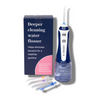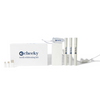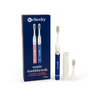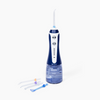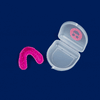It can happen to anyone, and it can get you when you’re sleeping. But grinding your teeth is nothing to be afraid of, and it’s really easy to treat. The hardest part is knowing if you’re doing it.
Bruxism is the fancy medical term for grinding or gnashing your teeth. Of course, it’s much easier to catch yourself grinding your teeth during the day because you’re conscious but bruxing most often occurs while you’re sleeping.
Sleep bruxism is often associated with other sleep movement disorders. If you’re having issues with insomnia, snoring, or something similar, you’re likely clenching your teeth too.
What Happens When You Grind Your Teeth?
If you’ve ever glanced around your dentist’s office, they probably have a model of a tooth sitting around. But you probably haven’t studied it in great detail since you spent most of your appointment staring at the ceiling.
Your teeth are coated in enamel, and under that enamel is a substance called dentin. Dentin makes up the majority of each tooth and is yellow in color. Hence, if you don’t brush enough or wear away at your teeth, they begin to look yellow. And whitening strips can only do so much.
The good news is that your dentin can repair itself. The bad news is that the more you wear at your tooth enamel, the more sensitive your teeth will be. We want to avoid tooth sensitivity as much as possible, so it’s important not to add to your teeth’s natural wear and tear with bruxism.
Signs of Teeth Grinding
If you have a partner, you can ask them to listen to you while you sleep to see if they can hear you grinding your teeth. However, if you aren’t excited by the idea of your partner going all Edward Cullen on you, there are some things you can look out for when you’re awake.
If you find yourself with:
- Tense or sore jaw muscles
- Flattened teeth or worn tooth enamel
- Cracked, chipped, or loose teeth without any known trauma to your jaw
- Sensitive teeth
- Pain near your ears or temples
- A clicking sound in your temporomandibular joint (TMJ)—AKA your jaw joint—when you open your mouth
- Headaches radiating from your temples
Additionally, if you’re reading this article right now and your teeth are touching, your jaw is too tight. If you feel one or more of these symptoms, you should see your dentist for an official diagnosis.
It’s also essential to be proactive before you start to see some of these significant symptoms. Doctors have multiple theories about what causes bruxism, but most believe it’s a combination of physical and psychological factors.
Factors that increase your chance of teeth grinding:
- Stress and anxiety – and goodness, haven’t we all been stressed out over the last year?
- Age – teeth grinding is extremely common in children and usually goes away by adulthood (keyword: usually).
- Your glowing personality – if you are aggressive, competitive, or hyperactive, it’s more likely that you grind your teeth. There’s no shame here; you just have to know yourself.
- Medications – if you are on certain psychiatric medications, such as some antidepressants, you may be at a higher risk for bruxism. Do NOT stop taking your prescriptions but consider investing in a mouthguard.
- Other substances – we hate to be the bearers of bad news, but smoking tobacco products, consuming alcohol, and drinking caffeinated beverages can lead to increased teeth gnashing.
- Your family – there is some evidence to suggest that bruxism is genetic. If you have a relative who grinds their teeth, there’s a chance you’ll grind yours too.
- Temporomandibular disorders (TMD) – these affect your TMJ and can lead to severe grinding while your jaw is tense.
- Other medical conditions – bruxism is rarely a standalone issue and generally appears as a side effect. Certain disorders like Parkinson’s disease, dementia, acid reflux, epilepsy, sleep apnea, and ADHD can lead to teeth grinding.
Your dentist will be able to confirm whether or not you’re bruxing, and they’ll keep an eye out for teeth issues in your future visits. There are some steps you can take to get your jaw feeling better.
Sensitive Teeth and Bruxism
Having sensitive teeth as an adult is never a good sign, but it doesn’t automatically mean that you’re bruxing.
Tooth sensitivity is also known as “dentin hypersensitivity” because your dentin has become exposed due to the wearing of your tooth enamel. This sensitivity can last a little while or a long while, radiating from a single tooth or multiple teeth.
Sensitivities include pain or discomfort when your teeth come into contact with: hot foods/beverages, cold foods/beverages, cold air, sweet foods/beverages, acidic foods/beverages, cold water (especially when performing your oral hygiene routine), and mouth rinses.
If your teeth are chronically sensitive, you should make an appointment with your dentist as soon as possible to determine whether the sensitivity is caused by bruxism or a cavity.
Treating Bruxism with a Mouthguard
Step one of treating bruxism is identifying and treating the root of your teeth grinding. As you work on that, you can begin exploring your options to prevent gnashing your teeth in your sleep.
A dental night guard may be just the thing you need and is likely the first thing your dentist will recommend once they’ve diagnosed you with bruxism.
Unfortunately, you’ll likely shy away from the idea of a custom nightguard from your dentist as soon as you hear how much it’ll cost. Especially since insurance doesn’t lend a hand. You could go to your local drug store and grab a generic mouthguard, but it won’t necessarily do the trick to keep your teeth happy. Discovering a balance between comfortable and affordable in a mouthguard has been challenging until now.
Getting Cheeky
We believe getting a custom nightguard shouldn’t cost you a canine and a molar. Say bye-bye bruxism and get Cheeky today.
